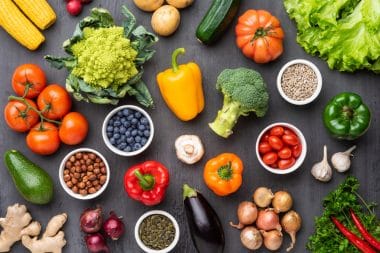Eating foods that cause inflammation can lead to everything from weight gain to debilitating joint pain. By understanding the biggest culprits of inflammation, you will know what foods to avoid and what to eat instead. Here we outline the top ten foods that are causing inflammation in your body and replacement ideas.
#1: Sugar
While it is probably not a surprise that sugar should be limited in your diet, many people are blissfully unaware of just how much damage sugar can do. Our bodies cannot handle high glucose levels because we don’t have the means to process it quickly. As levels stay elevated, our body’s produce pro-inflammatory messengers known as cytokines to handle the excess.
Try Instead:
Look for foods that are high in protein to help balance your glucose level. If you are looking for a sweet treat try a piece of fruit or small piece of dark chocolate to curb the craving.
#2: Fried Foods
Fried foods are another major pitfall in terms of inflammation. Foods fried in vegetable oil contain high levels of inflammatory advanced glycation end products (AGEs). AGE’s are a marker for inflammation. A study release by the Mount Sinai School of Medicine outlined that people who limited their intake of fried foods showed a significant drop in their level of AGEs. This shows that the less fried food you eat, the lower your inflammation.
Try Instead:
Fortunately by limiting these foods you will see a decrease in inflammation. Foods prepares with healthier fat like olive or coconut oil can help you ward off inflammation.
#3: Vegetable and other Omega-6 Rich Oils
As we learn more about Omega-6 fatty acid and it’s effects on inflammation, we know that limiting these types of fats is critical for a health body. Try to avoid foods prepared with vegetable, corn, safflower, sunflower, grape seed, soy and peanut oils.
Try Instead:
Foods prepared with oils rich in Omega-3 fatty acid, like olive oil or coconut oil are much better choices. To control the quality of foods like salad dressing, try making your own. You might be surprised how easy it is to whip up a dressing that delights your taste buds!
#4: Dairy
Another contender for worst inflammation causers is the surprise category of dairy products. Humans have been consuming milk for thousands of years. However, only in the past twenty years did we discover that our bodies do a poor job processing the high levels of casein and lactose found in milk. When we eat or drink a dairy product our bodies see it as a foreign substance and react with an inflammatory response.
Try Instead:
Replacing cow’s milk is simple with so many options including rice milk, almond milk, soy milk and even cashew milk. Cheeses that are made from goat’s milk offer a healthy alternative. While you don’t have to say goodbye to pizza, less is more when it comes to dairy.
#5: Refined Flour
Flour in its original form was chock-full of healthful ingredients that aided in digestion. Today’s flour has been refined and foods like crackers, bread, white rice and bagels now lack the slow-digesting fiber that helped us process it.
Try Instead:
Look for natural and unrefined flours to replace their less healthful refined equivalents.
#6: Gluten
The more we understand about gluten, the more it seems to become a food we should all limit. In addition to the allergen issues, even people who can tolerate gluten will find that it can lead to inflammation. A 2013 study published in the Journal of Nutritional Biochemistry showed that by cutting gluten from their diets, participants saw a reduction in adiposity (a measure of the amount of body fat), inflammation and insulin resistance. Avoiding gluten can be a key part of avoiding inflammation.
Try Instead:
As we have become more aware of the trouble stemming from gluten consumption, more food producers are offering gluten free options.
#7: Artificial Ingredients
If you can’t read an ingredient listed on your food package, then chances are that your body won’t recognize it either. Artificial ingredients like food additives, preservatives, artificial coloring and flavoring are chemicals compounds that are foreign to our bodies. Every time we eat one of these chemical laden foods, our bodies launch an immune system response, leading to inflammation.
Try Instead:
Stick to foods with labels where you can easily read all of the ingredients listed. The more natural you eat, the less inflammation you will have.
#8: Saturated or Trans-Fats
Every time we eat saturated or trans-fats our bodies launch a full-scale attack in the form of inflammation. Trans-fats, like hydrogenated oils, cause the body to release low-density lipoproteins, which lead to inflammation. A 2004 study published in the American Journal of Clinical Nutrition found that women with diets high in trans fat had higher levels of markers that show systemic inflammation, like interleukin 6 (IL-6) and C-reactive protein (CRP).
Try Instead:
Stick to unsaturated and cis fats, like monounsaturated and polyunsaturated fats, which increase our levels of good cholesterol (HDL) and decrease bad cholesterol.
#9: Grain Fed Meats
Most grain fed livestock is given antibiotics and hormones to help them grow. Historically, chickens, cows and pigs did not eat a grain-based diet, which is now the primary feeding source. This led to the need for potentially harmful chemicals in order to reach full size.
Try Instead:
While the cost is a little higher, grass fed meat that is not exposed to hormones or antibiotics is worth the tradeoff in terms of your health.
#10: Fast Foods
While many chains are cropping up with healthier menu items, fast food remains a major contributor to nationwide inflammatory problems. Avoiding the pitfalls of fried fast food that is generally loaded with saturated fats will help curtail inflammation.
Try Instead:
When you can’t cook at home, look for those healthier dining options that skimp on unhealthy fats and offer organic and chemical free meats.
By avoiding these ten food groups you can help keep inflammation at bay. While no one is perfect, limiting these foods will help keep your body healthy and free from unwanted inflammation.








Reply